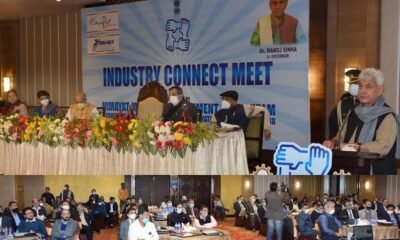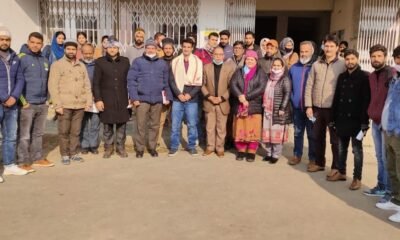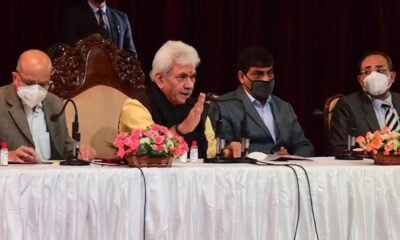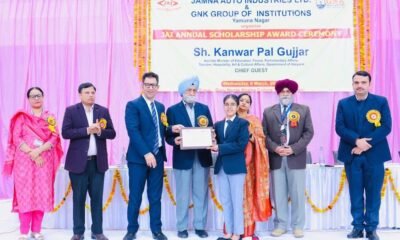BK News
Srinagar, May 2: As an institution of vital and systemic significance to the economy of entire region, J&K Bank shall resolutely provide all possible support to the Trade and Industry of J&K. We will stand with the business community in all eventualities. In fact, being fully conscious about the conditions prevailing in the UT, the bank has already adopted a pro-active approach and constituted committees, headed by the Executive Presidents that have already started wide-ranging deliberations with the various stakeholders to assess the Impact of COVID-19 on different sectors of J&K economy including trade, tourism, manufacturing, hospitality etc. and devising effective and immediate economic measures to overcome it.
This was stated by the J&K Bank Chairman & Managing Director R K Chhibber after congratulating the Jammu Chapter of PHD Chamber of Commerce & Industry for organizing a well-timed video conference titled – Emerging Scenario and Impact of Covid 19 and Economic Measures to Counter It.
The video-conference, with the R K Chhibber as the Chief Guest and Key-note Speaker, had a wide range of participants including Director J&K Bank Vikram Gujral, PHDCCI (National) Vice President Pardeep Multani, Former (National) President PHDCCI Anil Khaitan, Director Mallika Verma, PHDCCI ‘s Jammu Chapter Chairman Rakesh Wazir, Co-Chairman Rahul Sahai, Former Chairman Vikrant Kuthiala, Kashmir Region Mentor Mushtaq Ahmad Chaya, Chairman Baldev Singh Raina, J&K Banks Executive Presidents Arun Gandotra, Sunil Gupta, Ghulam Nabi Teli, President Chetan Paljore, Zonal Heads Sushil Gupta, Sunit Kumar, Sudhir Gupta, Vibhakar Khajuria, Former Co-Chairman Jammu Kuldeep Gupta, Chairman HRAK Sham Lal Kesar, President Bari Brahamana Industrial Association Lalit Mahajan, Institute of Chartered Accountants of India’s J&K Chapter Chairman Lalit Gupta, PHDCCI Convenor (Head) Reasi District Varinder Kesar, Convenor (Head) Patnitop Kushal Magotra, Director Radisson Jammu Vikram Gupta, Director Ramada Jammu Sidhant Choudhary, Anil Gupta from Pharmaceutical Association of Jammu besides the heads of Various Associations and business tycoons from all over J&K besides National leadership of PHDCCI.
“Due to COVID-19 pandemic, industries all over the world are in distress and in J&K we are continuously struggling with this kind of situation. However, J&K Bank shall provide every kind of support and help to the trade and industry of J&K and resolve all the mutual concerns and issues within the regulatory guidelines. And given the kind of synergy and seriousness that exists between the government and Bank, the issues faced by the business community shall be looked into for resolution”, the CMD said.
He further stated that the pandemic has disrupted the business in whole India but J&K in particular has suffered a lot because its economy is directly or indirectly connected with tourism which has been received the major brunt. “Every possible help would be extended to the people related to the sector overcome these losses besides highlighting their issues, which directly does not pertain to bank, at appropriate forums”, he added.
Earlier, while welcoming the JK Bank CMD and other dignitaries from J&K and New Delhi, Chairman PHDCCI Jammu Chapter Rakesh Wazir acknowledged the valuable contribution of J&K Bank towards helping and assisting the entrepreneurs of all sectors of economy of J&K. He thanked the CMD and his team for being available for the conference.
He also congratulated newly promoted Executive Directors of J&K Bank and put forward the problems faced by the industries and service Industry in particular in J&K during lockdown and requested for a breather to the tourism industry. He suggested an extension of moratorium period of all term loans including the projects which are under execution along with interest waiver for one year.
He also requested for providing working capital to the Hotels. He further said that Bank should give 6 months of expenses to the Hotels & Restaurants for survival and convert it into 3 year soft loan with 6 months moratorium.
All the speakers on the occasion lauded the systemic role of J&K Bank in the J&K economy and appreciated the proactive role adopted by its leadership to engage with, listen to the stakeholders in order to arrive at a mutually beneficial resolutions of the issues that have arisen out of the ongoing pandemic. The speakers emphasized upon the bank to extend all RBI benefits to trade and industry sector besides requesting the leadership to enhance the additional working capital funds to 25%-30% of the existing finance as the banks already announced 10% will not suffice the needs of businesses at all.
While highlighting the immensity of the current crisis that the trade and industry of J&K is beset with, the speakers underlined the fact that the cash flows had got disrupted in J&K since August 2019 but now due the Covid 19 cash flows have taken a hard hit for a longer term. The participants also put forward many suggestions, demands and raised concerns regarding the various sectors of the economy, which were properly recorded for further deliberations and possible resolutions in the near future.
Towards the conclusion of the online interaction, CMD R K Chhibber thanked the participants for their valuable inputs and reiterated the bank’s commitment to support and financially empower every sector of the J&K economy.
Director PHDCCI Mallika Verma moderated the session and shared her inputs during the virtual interaction.



 Industry4 years ago
Industry4 years ago


 Economy2 years ago
Economy2 years ago


 Energy4 years ago
Energy4 years ago


 Infra4 years ago
Infra4 years ago


 AgriBiz4 years ago
AgriBiz4 years ago


 Jobs4 years ago
Jobs4 years ago


 Careers4 years ago
Careers4 years ago


 Economy4 years ago
Economy4 years ago





















